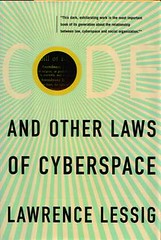Building on this week’s Cato Unbound online debate over the impact of Lawrence Lessig’s Code ten years after it’s release, Tim Lee has posted a terrific essay over at the Freedom to Tinker Blog “Sizing Up “Code” with 20/20 Hindsight.” Tim concludes:
It seems to me that the Internet is rather less malleable than Lessig imagined a decade ago. We would have gotten more or less the Internet we got regardless of what Congress or the FCC did over the last decade. And therefore, Lessig’s urgent call to action — his argument that we must act in 1999 to ensure that we have the kind of Internet we want in 2009 — was misguided. In general, it works pretty well to wait until new technologies emerge and then debate whether to regulate them after the fact, rather than trying to regulate preemptively to shape the kinds of technologies that are developed.
As I wrote a few months back, I think Jonathan Zittrain’s The Future of the Internet and How to Stop It makes the same kind of mistake Lessig made a decade ago: overestimating regulators’ ability to shape the evolution of new technologies and underestimating the robustness of open platforms. The evolution of technology is mostly shaped by engineering and economic constraints. Government policies can sometimes force new technologies underground, but regulators rarely have the kind of fine-grained control they would need to promote “generative” technologies over sterile ones, any more than they could have stopped the emergence of cookies or DPI if they’d made different policy choices a decade ago.
I agree whole-heartedly, of course, and this is the point I was trying to make in my in my first essay in the Cato debate when I argued:
Lessig’s lugubrious predictions proved largely unwarranted. Code has not become the great regulator of markets or enslaver of man; it has been a liberator of both. Indeed, the story of the past digital decade has been the exact opposite of the one Lessig envisioned in Code. Cyberspace has proven far more difficult to “control” or regulate than any of us ever imagined. More importantly, the volume and pace of technological innovation we have witnessed over the past decade has been nothing short of stunning.
Anyway, read Tim’s entire essay.


 During my summer internship at
During my summer internship at  The Worst:
The Worst:
 On this episode of “Tech Policy Weekly,” we’re launching a new format called “Tech Book Corner” that will feature occasional conversations with the authors of important new books about technology policy and the other issues that we debate frequently at the Tech Liberation Front blog.
On this episode of “Tech Policy Weekly,” we’re launching a new format called “Tech Book Corner” that will feature occasional conversations with the authors of important new books about technology policy and the other issues that we debate frequently at the Tech Liberation Front blog.
 The Technology Liberation Front is the tech policy blog dedicated to keeping politicians' hands off the 'net and everything else related to technology.
The Technology Liberation Front is the tech policy blog dedicated to keeping politicians' hands off the 'net and everything else related to technology.